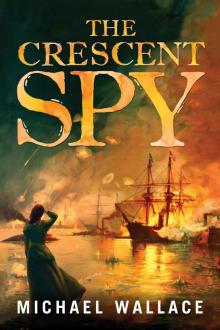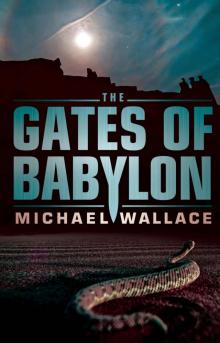- Home
- Michael Wallace
The Crescent Spy Page 7
The Crescent Spy Read online
Page 7
Franklin’s idea was to come into New Orleans as strangers, and so they boarded the blockade-runner separately. It was a fast, low steamer that carried fifteen passengers and a hold stuffed with six small rifled cannons and whatever else the captain could squeeze in around the main cargo: boots, percussion caps, casks of wine, boxes of square nails, and several barrels of gunpowder. They left at night in case Union warships were patrolling offshore, and cut straight for the Gulf Coast.
When dawn came the next morning, the engines seemed to be straining against the choppy waves, and when Josephine joined the passengers on deck, she found them all watching a column of smoke to their rear at the very edge of what one could see without a spyglass.
“Yankees,” a woman told Josephine. “Captain thinks it’s a steam frigate. Thirty guns—one volley would blow us to kingdom come. But don’t worry, we’re not in danger.”
“How can you be sure?” Josephine asked, keeping her eye on the column of smoke.
“Trust me. I’ve done this run three times. We’re built for speed—we’ll outrun them.”
The side-wheel kept churning, and Josephine knew from the high-pitched whine that it was going flat out, the men below shoveling coal into the boiler as fast as they could. The longer they ran, the more they risked overpressuring the boiler. After her experiences on the river, that prospect filled her with a special kind of terror.
The woman was wrong. Over the next hour, a small figure gradually took shape beneath that column of smoke, and it became obvious that the blockade-runner would be overtaken by the blockade enforcer. Josephine risked looking for Franklin, and she spotted the Pinkerton agent near the stern, his hands around the spray-soaked rail, nervously twisting at the wood as he watched the ship approach. That made her more worried than ever.
Shouldn’t the navy have been warned of their passage so they could slip by unmolested? What if the Union ship overtook them? Would they fire their cannons and sink the blockade-runner, or just board it?
The first thing to go were the heavy boxes of nails, then the gunpowder, and finally two of the cannons, heaved up to the deck by the crew and pushed over the edge. The low-lying schooner-rigged side-wheel lifted higher in the water, but still the navy frigate stayed within view. The captain and his first mate discussed in agitated tones whether to dump the remaining cannons or to throw over the passenger baggage as well. It was clear that any- and everything would go except for coal for the boilers and the passengers and crew themselves.
Then a man at the stern with a spyglass gave a shout and declared that the frigate was falling behind. Cheers rang across the deck.
“Well,” the woman said to Josephine. “That was a narrow shave, as my husband would say.”
“Which one is he?” Josephine asked, looking among the passengers.
“Oh, no. He’s in Memphis. I’m traveling alone—my husband did business up north before the war and earned some enemies in Louisiana. So I’m his business agent this time around.”
Josephine had been standing next to the woman for a good hour, hour and a half, but her attention had fixed on that smokestack and the approaching (now receding) Union warship. Now she turned and sized the other woman up for the first time.
And had a moment of shock as she turned and met the woman’s smile. The woman was older now, her red hair color seemingly dyed, as if to cover a graying head, and her corset and stay couldn’t conceal a waistline that had expanded since her riverboat days. But it was Francesca Díaz, one of the women who had sung and danced with Josephine’s mother. Josephine hadn’t seen the woman since they left Crescent Queen for Cairo Red. If Claire had ever met her old friend again after that, she’d never mentioned it to her daughter.
Francesca was smiling, looking at her, and Josephine’s shock turned to relief as she realized that the woman didn’t recognize her in turn. But that might change if Josephine stood gaping.
“My name is Miss Breaux.” Josephine figured her last name was safe, having been picked up during her final stay in New Orleans. She didn’t know her mother’s true surname—certainly not de Layerre—and hadn’t wanted to take on the unsavory stage name.
Josephine held out her bare hand. Unlike Francesca, she had not put on gloves before coming out to the deck. Francesca shifted her parasol—now catching as much sea spray as sunshine—and returned a dainty shake.
“I am Mrs. Hancock. You shouldn’t get the wrong idea—my husband is a great patriot and believer in the Southern cause. But this war makes friends of strangers and strangers of friends. There is trouble in New Orleans and the bayou. That’s why I went to Havana instead of him.”
“Oh, I thought maybe you had family in Cuba.”
Francesca laughed. “Oh, no. My family is pure French. From Provence.” She gestured at the parasol. “That’s why I must be careful about taking the sun. I don’t want to turn as brown as a Marseillaise fisherman.”
That wasn’t what she’d claimed when she went by Francesca Díaz. She’d claimed to be from Spain, and with much the same reasoning about why she avoided the sun. Perhaps a Spanish origin was better for a dancer, with its connotations of gitanos and flamenco, but French was better for snaring a rich husband.
Now Josephine took a closer look at the woman, and with an adult eye, jaded and suspicious, as she’d learned during her newspaper writing. There was something dark and exotic about the woman’s appearance. She easily could have passed for one of the hacienda owners of Cuba, or had she been in Washington, the Persian ambassador’s wife. And now Josephine had another suspicion that had appeared with Francesca’s shifting story.
Perhaps Francesca was an old-fashioned New Orleans creole, that mix of French, Spanish, and African. French coureur de bois and mulattoes coming together to give birth to quadroons, octoroons, and all the other mixed colored people with their own culture and customs. It was one thing to be a free person of mixed race in New Orleans but another thing to go upriver to Mississippi, Missouri, or Illinois and by her very existence inspire prejudice, violence, and even blackmail.
It was obvious now that they had outrun the Union frigate, albeit at a cost of two cannons and what must have been hundreds of dollars of other vital supplies. The warship had vanished, and all they could see now was the long stream of black smoke slowly dissipating in the brilliant blue sky over the Gulf of Mexico.
“And what brought you to Havana, Miss Breaux?” Francesca asked.
Josephine smiled. “I lived for a spell up north, but with the outbreak of the war, I had my own . . . troubles. It was time to come home to the South, and I couldn’t do so directly. I sailed out of Brooklyn on the twenty-seventh of July.”
“You have family in New Orleans?”
“They’re scattered,” she said. This much was true. “I hope to get a position with one of the papers. I have some newspaper experience, and I thought I could lend my voice to our struggles. There are a lot of foreigners in town, many English and French, especially, and if persuaded, they might carry our sympathies to their home countries.”
Francesca’s eyes widened. “Wait a moment. Josephine?” Her voice was loud, and several other people looked over.
Josephine’s stomach flipped over. Her eyes flickered to one side, and there she spotted Franklin, his hat pulled low over his brow against the sun. He was staring hard.
“It is, isn’t it?” Francesca pressed. “It’s Josephine Breaux. I don’t believe it.”
Still two days from reaching New Orleans and already she’d been discovered. Franklin would be furious. He’d no doubt telegraph Washington, who would have no choice but to pull her from the city, unless they simply disavowed her and left her to her own devices. She cursed silently. Unless she could quiet this woman down in a hurry, put her off the scent . . .
“I’m afraid you’re mistaken,” she said. “That’s not my name.”
“Oh, please. None of that false modesty.” Francesca’s excitement seemed to be mounting. “You’re a heroine! It’s all the
y were talking about when I left the city ten days ago. So much ink spilled in the papers. That business at Manassas. And the way those blackguards threw you out of Washington. They were no gentlemen.”
As Francesca prattled on, it gradually dawned on Josephine that the woman didn’t recognize her at all. They hadn’t met for years, since the younger woman was still a waifish girl, and Francesca had apparently not connected that child to the young woman of the same given name standing next to her. But the woman had heard of a certain reporter in Washington City, unmasked first as a woman, then as a Confederate spy. It had only been a minor news item in the New York papers but had apparently made big news in New Orleans and the rest of the Southern press. One more thing to crow about in the aftermath of the Confederate victory at Manassas.
Later, when the handful of passengers had departed for their various cabins, a knock came at Josephine’s door. It was Franklin, apparently abandoning his commitment to ignore her until they were safely ensconced in New Orleans. He chewed nervously on his lower lip.
Josephine had been at her cramped desk next to the porthole window, scribbling notes about the outrunning of the steamer frigate to go with several pages she’d written about her time on the clipper and their three-day stopover in Havana.
She rose to her feet. “I am so sorry. That was a terrible blunder. I never should have used the name Breaux. Why didn’t I think?”
She expected him to be angry, but he only shook his head.
“This is my fault as much as yours. We were being watched in Havana, so I didn’t collect or send telegrams. I figured any news could wait until New Orleans.”
“Watched? By whom?”
“That’s not important. The point is that I didn’t check or I might have been warned that you were notorious in Louisiana, and we could have found a more suitable last name.”
“So what now?”
For a long moment Franklin stood silently at the doorway. He took out his cigarette case but only turned it over in his hand without taking one out. Josephine grew nervous, worried that he would tell her it was over, that she’d be sent back north. And it surprised her how committed she’d become to this plan, not only for personal glory, but for duty as well. The feeling had been growing since Brooklyn and had spread as she watched Confederate agents and smugglers working with great purpose and energy in Havana.
“Don’t send me back,” she said. “I can travel upriver to St. Louis or Memphis for a spell. I’ll change my appearance, take on a new name, practice a new accent, and come back under another guise.”
“That’s assuming you can get in and out of New Orleans without the entire city marching you at the head of a parade. What’s more, I’d arranged a position for you at Fort Jackson. They have an infirmary, and the surgeon on site needs an assistant, has asked for a pretty young woman who can raise the cheer of the men as they recover.”
This wasn’t a surprise to her. That evening at the White House, when the president had departed, the two agents had asked her a few questions about her health. They seemed satisfied when she said that she wasn’t squeamish at the sight of blood, and pleased when she told them that she’d suffered yellow fever as a child. That meant she was immune to the epidemics that regularly swept up and down the swampy lands of the lower Mississippi. She’d already guessed that they meant her to work in a charitable hospital, posing as a Confederate Florence Nightingale.
“And you’re worried they’ll give it to someone else while I’m gone?”
“Dr. Mingus isn’t one of us. He’s holding your position as a favor for a friend, who is our man.” Franklin shook his head. “And I’m still worried that you’d be recognized. Then there would be questions, especially if you’d affected an accent and false name.”
“Then maybe—” she began.
He lifted a hand to hush her and glanced down the hallway outside her room.
Voices sounded, one of the crew talking to a man with an English accent. Franklin tucked away his silver case and looked briefly like he was going to turn and leave. After a moment, though, he relaxed.
“All right, they’re gone,” he said. “Go on.”
She continued. “Then maybe I don’t affect anything. Maybe I arrive in New Orleans and accept whatever attention comes my way. This isn’t so far off my original plan.”
He looked intrigued. “Explain.”
She told him about her initial thoughts after Barnhart had dismissed her from the Clarion. Even while fuming as Franklin and Mr. Pinkerton led her on that humiliating march past the brothels on Rum Row, she’d been thinking about the New York press. She would buy a ticket to Manhattan and use every tool at her disposal to secure a position: her writing ability, foremost, but also her determination, her ambition, and even her feminine charm if necessary. Why not? If something as ridiculous as her sex meant that people discounted the skill of her pen, then she was damned if she’d turn down what advantages being a woman offered.
So why not, she now suggested, march into the offices of the New Orleans Daily Crescent or the Picayune and try the same thing? Secure a position with pure swagger.
“Not pure swagger,” she corrected. “I can write better, faster, than anyone they’ve got on staff.”
“Oh, you were in the habit of reading the Crescent up north?” Franklin asked with a smile.
She thrust out her chin. “I don’t have to. The best papers in the country are in New York, and they still publish ninety percent rubbish.”
He laughed, and she could see the tension easing from his features. “It might work.”
“Of course it will work,” she said. “If I’m as notorious as Miss—”
She almost said Díaz, then remembered that Franklin didn’t know that Josephine had met Francesca before. Admitting that would open her to all sorts of uncomfortable questions that she had no desire to discuss with anyone, let alone a near stranger with whom she intended to remain professional and cordial.
“Excuse me, Mrs. Hancock. If I’m as notorious and popular as she claimed, then any secessionist paper would be delighted to have me, woman or no. And not writing gossip about snooty creole society, either. I’ll be able to come and go as I please, interviewing generals, writing to boost Southern morale.”
“You won’t be popular for long. If we succeed, you’ll be the most reviled woman south of the Mason–Dixon. And if we don’t, if New Orleans stays in rebel hands . . .”
“Say it. I won’t flinch.”
“Very well. If New Orleans stays rebel, and it’s found you played the heroine while really reporting to the enemy . . .” Franklin shook his head. “As you said, woman or no . . . you’ll be hung as a traitor and spy.”
The Mississippi River delta spread deep into the Gulf of Mexico, and though the US Navy had blockaded the main channels, there was no way to stop up the dozens of minor estuaries and channels that emerged from the swamp. To get up the river, the shallow-draft smuggling boat hired a bayou fisherman to pilot them through.
They followed the man through meandering channels among the mudflats, the waterways surrounded by thick grass and the bony knees of cypress. Turtles sunned on logs, and egret and heron lifted heavily into the air as they approached. The pilot was careful to lead them around sandbars and “sawyers”—uprooted trees that had lodged in the water and swayed back and forth to hook unsuspecting boats.
In spite of the expert navigation, they found themselves up a blocked channel turned into an oxbow lake. It was barely wide enough for the blockade-runner to turn around, but when they tried to turn around they hit a bar. The engine strained, the side-wheel churning in the mud as it tried to free them.
And there they remained, as afternoon turned to night. The weather was sweltering and miserable, and clouds of mosquitoes beset them. Lamps illuminated the eyes of enormous alligators gliding by the side of the boat. Josephine retreated to her room to write by lamplight, until the swarming bugs forced her to turn out the light and pull her blanket over her head.
/>
She rose in the morning to find fishermen in flatboats and canoes surrounding the stuck blockade-runner. Josephine felt almost sorry for the side-wheel captain, a small, nervous creole who spoke a patois French with the lean, hungry-looking men of the delta. First, he’d dumped much of his cargo to outrun the navy steamer, and now he was handing over what must remain of his anticipated profits to the men working to unload the goods and lighten the ship.
It took a full day just to unload the cannons, one after another, onto smaller smuggler boats that appeared from around the bend: flatboats with huge paddles attached to the rear and roof. Next went the rest of the supplies, and the passengers themselves off-loaded into fisherman skiffs to be taken into the swamp. Josephine found herself alone with a hollow-faced, balding man who watched her with a sharp expression as he rowed her up one of the main channels to God knew where. As they traveled, he stopped to check lines tied to the branches of cypress trees. From one of these, he hauled in a large catfish, which he tossed, flopping at Josephine’s feet, where it lay gulping for air.
The fisherman soon pulled up to a one-room swamp house on stilts, surrounded by towering cypress that dripped with Spanish moss. He held his boat steady while she climbed out. Her feet squished and filled with muddy water as she picked her way through the cypress knees that thrust from the muck. She hadn’t reached the relatively dry ground by the house before the fisherman was paddling away without explanation. He came back a couple of hours later with another woman from the ship. She was a rough-looking sort, like a Kentuckian’s wife. The two women sat awkwardly on the porch until the man returned yet again, this time with Francesca Díaz, or Mrs. Hancock, as she styled herself now. The woman used her parasol as a cane as she came off the boat wincing. She appeared to have twisted her ankle or suffered some other injury and seemed none too pleased as she took in their surroundings and then hobbled over to the fisherman’s shack.

 Crowlord (The Sword Saint Series Book 2)
Crowlord (The Sword Saint Series Book 2) Crowlord
Crowlord The Red Sword- The Complete Trilogy
The Red Sword- The Complete Trilogy Wandering Star (The Quintana Trilogy Book 1)
Wandering Star (The Quintana Trilogy Book 1) Bladedancer
Bladedancer Sword Saint
Sword Saint The Alliance Trilogy
The Alliance Trilogy Chasm of Fire
Chasm of Fire Bladedancer (The Sword Saint Series Book 4)
Bladedancer (The Sword Saint Series Book 4) The Devil's Deep
The Devil's Deep Shadow Walker (The Sword Saint Series Book 3)
Shadow Walker (The Sword Saint Series Book 3) Starship Blackbeard
Starship Blackbeard The McHenry Inheritance (Quill Gordon Mystery Book 1)
The McHenry Inheritance (Quill Gordon Mystery Book 1) Sun King (The Void Queen Trilogy Book 3)
Sun King (The Void Queen Trilogy Book 3) Blood of Vipers
Blood of Vipers Righteous - 01 - The Righteous
Righteous - 01 - The Righteous I Scarce Can Die (Quill Gordon Mystery Book 5)
I Scarce Can Die (Quill Gordon Mystery Book 5) The Devil's Cauldron
The Devil's Cauldron The Wicked (The Righteous)
The Wicked (The Righteous) Crow Hollow
Crow Hollow Righteous03 - The Wicked
Righteous03 - The Wicked Righteous02 - Mighty and Strong
Righteous02 - Mighty and Strong Blood of the Faithful
Blood of the Faithful Wash Her Guilt Away (Quill Gordon Mystery Book 2)
Wash Her Guilt Away (Quill Gordon Mystery Book 2) The Kingdom of the Bears
The Kingdom of the Bears The Emerald Crown (The Red Sword Trilogy Book 3)
The Emerald Crown (The Red Sword Trilogy Book 3) The Dark Citadel
The Dark Citadel The Warrior King (Book 4)
The Warrior King (Book 4) Rebellion of Stars (Starship Blackbeard Book 4)
Rebellion of Stars (Starship Blackbeard Book 4) Righteous04 - The Blessed and the Damned
Righteous04 - The Blessed and the Damned The Crescent Spy
The Crescent Spy Queen of the Void (The Void Queen Trilogy Book 1)
Queen of the Void (The Void Queen Trilogy Book 1) The Red Sword (The Red Sword Trilogy Book 1)
The Red Sword (The Red Sword Trilogy Book 1) The Sentinel (The Sentinel Trilogy Book 1)
The Sentinel (The Sentinel Trilogy Book 1) The Golden Griffin (Book 3)
The Golden Griffin (Book 3) The Blessed and the Damned (Righteous Series #4)
The Blessed and the Damned (Righteous Series #4) Hell's Fortress
Hell's Fortress Not Death, But Love (Quill Gordon Mystery Book 3)
Not Death, But Love (Quill Gordon Mystery Book 3) Destroying Angel
Destroying Angel The Free Kingdoms (Book 2)
The Free Kingdoms (Book 2) Dragon Quadrant (The Sentinel Trilogy Book 2)
Dragon Quadrant (The Sentinel Trilogy Book 2) Shattered Sun (The Sentinel Trilogy Book 3)
Shattered Sun (The Sentinel Trilogy Book 3) The Wolves of Paris
The Wolves of Paris Lords of Space (Starship Blackbeard Book 2)
Lords of Space (Starship Blackbeard Book 2) Dreadnought (Starship Blackbeard Book 3)
Dreadnought (Starship Blackbeard Book 3) The Village of Dead Souls: A Zombie Novel
The Village of Dead Souls: A Zombie Novel The Black Shield (The Red Sword Book 2)
The Black Shield (The Red Sword Book 2) The Daughters Of Alta Mira (Quill Gordon Mystery Book 4)
The Daughters Of Alta Mira (Quill Gordon Mystery Book 4) Mighty and Strong (The Righteous)
Mighty and Strong (The Righteous) The Gates of Babylon
The Gates of Babylon